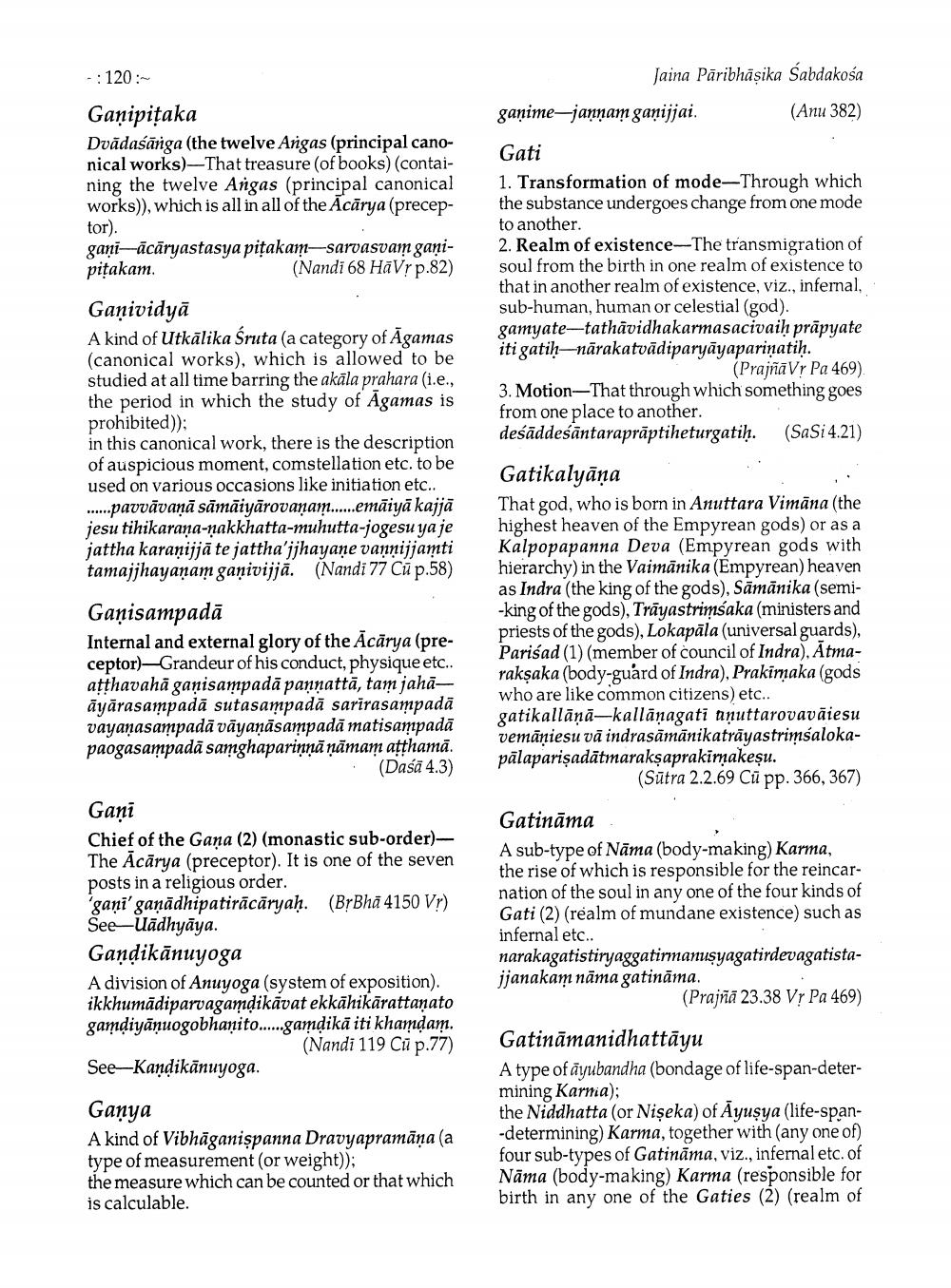________________
Jaina Pāribhāșika Sabdakosa ganime-jannam ganijjai.
(Anu 382)
-: 120:Ganipițaka Dvādasānga (the twelve Argas (principal canonical works)-That treasure (of books) (containing the twelve Angas (principal canonical works)), which is all in all of the Acārya (precep
tor)
gani-ācāryastasya pițakam-sarvasvam ganipitakam
(Nandi 68 HāVr p.82)
Gati 1. Transformation of mode-Through which the substance undergoes change from one mode to another. 2. Realm of existence-The transmigration of soul from the birth in one realm of existence to that in another realm of existence, viz., infernal, sub-human, human or celestial (god). gamyate-tathāvidhakarmasacivaih prāpyate iti gatih-nārakatvādiparyāyaparinatiḥ.
(PrajnaVr Pa 469) 3. Motion-That through which something goes from one place to another. deśāddeśāntaraprāptiheturgatiḥ. (SaSi 4.21)
Gaņividyā A kind of Utkālika Śruta (a category of Āgamas (canonical works), which is allowed to be studied at all time barring the akāla prahara (i.e., the period in which the study of Āgamas is prohibited)); in this canonical work, there is the description of auspicious moment, comstellation etc. to be used on various occasions like initiation etc.. .....pavvāvanā sāmāiyārovanam.....emāiyā kajjā jesu tihikarana-nakkhatta-muhutta-jogesu ya je jattha karanijjā te jattha'jjhayane vannijjamti tamajjhayaņam gaṇivijjā. (Nandi 77 Cup.58)
Gaņisampadā Internal and external glory of the Acārya (preceptor)-Grandeur of his conduct, physique etc.. atthavahā gaņisampadā pannattā, tam jahāāyārasampadā sutasampadā sarirasampadā vayanasampadā vāyaṇāsampadā matisampadā paogasampadā samghaparinnā ņāmam ashamā.
. (Daśā 4.3)
Gatikalyāņa That god, who is born in Anuttara Vimāna (the highest heaven of the Empyrean gods) or as a Kalpopapanna Deva (Empyrean gods with hierarchy) in the Vaimānika (Empyrean) heaven as Indra (the king of the gods), Sāmānika (semi-king of the gods), Trāyastrimsaka (ministers and priests of the gods), Lokapāla (universal guards), Parisad (1) (member of council of Indra), Atmarakşaka (body-guard of Indra), Prakimaka (gods who are like common citizens) etc.. gatikallāņā-kallānagati unuttarovavāiesu vemāniesu vā indrasāmānikatrāyastrimsalokapālaparişadātmarakşaprakimakeșu.
(Sūtra 2.2.69 Cü pp. 366, 367)
Gaņi Chief of the Gana (2) (monastic sub-order) The Acārya (preceptor). It is one of the seven posts in a religious order. 'gani' gaņādhipatirācāryaḥ. (ByBhā 4150 Vr) See-Uādhyāya. Gandikānuyoga A division of Anuyoga (system of exposition). ikkhumādiparvagamdikāvat ekkāhikarattanato gamdiyāņuogobhanito......gamdikā iti khamdam.
(Nandi 119 Cú p.77) See-Kandikānuyoga.
Gatināma A sub-type of Nāma (body-making) Karma, the rise of which is responsible for the reincarnation of the soul in any one of the four kinds of Gati (2) (realm of mundane existence) such as infernal etc.. narakagatistiryaggatirmanusyagatirdevagatistajjanakam nāma gatināma.
(Prajnã 23.38 VỊ Pa 469)
Ganya A kind of Vibhäganişpanna Dravyapramāņa (a type of measurement (or weight)); the measure which can be counted or that which is calculable.
Gatināmanidhattāyu A type of āyubandha (bondage of life-span-determining Karnia); the Niddhatta (or Nişeka) of Āyuşya (life-span-determining) Karma, together with any one of) four sub-types of Gatināma, viz., infernal etc. of Nāma (body-making) Karma (responsible for birth in any one of the Gaties (2) (realm of




